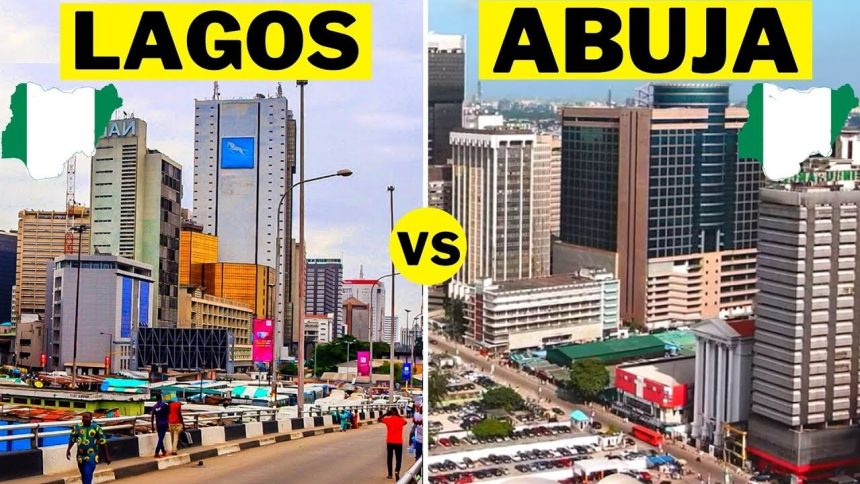BY: Deco Suleman
The rapid urbanization in Nigeria has significantly increased the demand for housing, causing rental prices to rise in major cities across the country.
This Housing TV Africa report examines the cost of accommodation in Nigeria’s most developed cities of Abuja and Lagos.
Lagos’ position as a key economic hub in West Africa and its dynamic business environment make it a magnet for both local and international residents. The city remains a prime destination for professionals, expatriates, and entrepreneurs eager to tap into its expanding tech sector and thriving industries.
Nestled in the heart of Nigeria, Abuja stands as a symbol of modernity and grace. As the nation’s political headquarters, the city exudes an air of sophistication and charm. Renowned for its meticulously planned infrastructure, lush greenery, and striking architecture, Abuja offers a harmonious blend of urban and natural beauty. The city’s vibrant cultural scene and elegant lifestyle make it an attractive destination for both residents and visitors alike.

This report will classify, compare, and analyze the cost of accommodation in Nigeria’s most vibrant cities, primarily based on location.
HIGHBROW AREAS
Lagos’s high-ranking neighborhoods, such as Victoria Island, Banana Island, Lekki Phase 1, Ikate, Chevron, Ikoyi on the Island and Ikeja GRA and Magodo on the mainland, are known for luxurious living and high demand for quality housing. Rent prices in such areas can be as high as five million naira per annum, depending on the nature of the accommodation. A studio apartment in such an area costs as much as three million naira and six million naira for a three-bedroom flat.
Renting a duplex around this axis costs around ten to fifteen million naira annually.
In Abuja, highbrow neighborhoods such as Maitama, Asokoro, Guzape and Katampe Extension pay the highest accommodation rent within the capital city. A studio apartment in Abuja’s most luxurious neighborhoods costs an average sum of one million, five hundred thousand naira; one-bedroom flats range from two million nairas to three million naira; two-bedroom flat, three million naira to five million; and a three-bedroom from five million naira to seven million naira.
The annual rent for duplexes in Abuja’s affluent and posh Districts ranges from twenty million naira annually. These neighborhoods are inhabited by the creme de la creme of Nigerian society such as captains of industries, Governors, Ministers, senators, and tech lords among others.
SEMI-HIGHBROW AREAS
Just as we have some exclusive upscale, wealthy, luxurious, prestigious, and ritzy neighborhoods in these cities, there is also a sizable number of neighborhoods within Abuja and Lagos that are overtly expensive. There are also areas and neighborhoods that middle-earning and not-so-stupendously wealthy Nigerians reside. In Lagos, places like Ajah, Surulere, Fadeyi, Yaba, Onipanu, Akoka, Shomolu, Anthony, and Maryland, among others fall into this class. In Abuja, Jabi, Life Camp, Games Village, Apo, Garki, and Wuse fall into this category.
The price of rent in semi-highbrow areas of Lagos and Abuja are similar in ranges and are heavily dependent on a number of factors such as access roads, availability of water, and security.
A studio apartment in Abuja and Lagos for semi-highbrow areas costs an average sum of seven hundred thousand naira; one-bedroom flat range from one million naira to one million five hundred thousand naira; two-bedroom flat, two million naira to three million; and a three-bedroom from three million, five hundred thousand naira to three million five hundred thousand naira.
URBAN AREAS
Low income earners who dwell in urban areas and satellite towns of Abuja and Lagos spend a high amount of their meagre earnings in high cost of rent. In Abuja, places like Kubwa, Lugbe, and Nyanya fall into these categories. In Lagos, places such as Ogba, Berger, Ikorodu, Epe, Agege, among others fall into this category.

A studio apartment in Abuja and Lagos for Urban areas cost an average sum of five hundred thousand naira; one bedroom flat range from six hundred thousand naira to eight hundred thousand naira; two bedroom flat, one million naira to one million five hundred thousand naira; and a three-bedroom from one million five hundred thousand naira to two million naira.
As Nigeria’s economic powerhouse, Lagos boasts numerous job opportunities across various sectors such as finance, entertainment, and technology. The city’s vibrant culture is reflected in its lively arts scene, music, festivals, and diverse culinary options. Additionally, Lagos is known for its bustling nightlife and myriad social activities, making it a great place for networking and socializing. However, Lagos does come with its drawbacks, including notorious traffic congestion that can significantly impact daily commutes. The cost of living is relatively high, especially in desirable neighbourhoods, and the city faces infrastructure challenges like inconsistent power supply and waste management issues.
On the other hand, Abuja, as the capital city and political headquarters of Nigeria, offers a more structured and less congested environment. The planned city is easier to navigate and has better infrastructure compared to Lagos. Being the seat of government, Abuja hosts numerous government offices and embassies, which is advantageous for those in politics or international relations. Generally, the quality of life in Abuja is more relaxed, and the city is perceived to be safer than Lagos. However, the job market is not as diverse, with most opportunities concentrated in government and NGOs. Also, Abuja’s social scene is quieter than Lagos, which may not appeal to everyone.
Each city has its own unique pros and cons with varying prices of house rents which is mainly dependent on many factors, such as social amenities available, level of security and accessibility.



